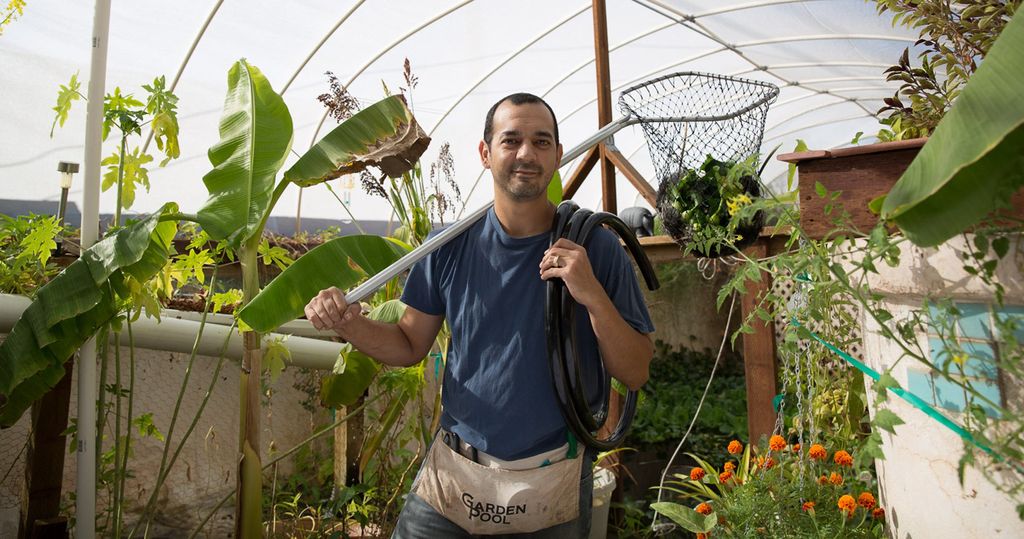|
Nine years ago, Dennis McClung had a rundown swimming pool and an ambitious goal, to plant a garden that would provide a self-sustaining food system for his family.
McClung and his wife transformed the empty cement pit behind their home in Mesa, Arizona, into a closed-loop ecosystem teeming with life, from vegetables to chickens, even a pond with tilapia. The innovative urban farm was soon producing enough food to feed the couple and their three young children, cutting their monthly grocery bill by almost half. But what McClung accomplished after that is even more remarkable. With no formal training, just plenty of ingenuity, hard work, and resourcefulness, McClung is now helping people around the world build climate-resilient and highly productive food systems. Since launching his nonprofit organisation Garden Pool, in 2012, McClung’s backyard experiment has bloomed into a multifaceted operation that is collaborating with foreign governments on food sustainability, operating public seed libraries, offering classes and workshops, developing a solar-powered water sterilisation system and most recently, working on a HoloLens application designed to help users build customised food systems. Though McClung’s farming methods might be low-tech, the technology he uses to power his organisation is not and driven by Microsoft. He uses Windows 10, Office 365 and a Surface device for graphic design, research, proposals, and marketing; collaborates with employees and volunteers remotely via Microsoft Teams; and uses Skype to teach a 3D modelling course to interns. Working with Chaney St Martin who is based in T&T, the Golden Grove Prison became the site of his latest imitative where inmates had been tending an enclosed garden in a field by hauling watering cans back and forth in the blazing heat. McClung set up a self-irrigating water collection system and a fish pond and added vertical growing, raising plants in stacked layers instead of in the ground to boost the garden’s production. Prison administrators were so excited about the changes that they asked for their own training session. “They said the project served as a model for them to do the same thing on their own farms,” says Chaney St Martin, an international specialist in water and soil management for the Inter-American Institute for Cooperation on Agriculture (IICA), which partnered with Garden Pool on the Trinidad project and several others in the Caribbean. There was almost no budget for the Trinidad prison project, McClung said, so instead of using a premade liner for the fish pond, he made one by mixing cement and sand. He built the pond’s pump from spare pipes and used some old cement blocks to create raised garden beds. “We really had to be MacGyver on this one, because the prison really didn’t have any budget,” McClung says, laughing. “We just looked at what they had, and we got really creative.” St Martin, met McClung at a conference a few years ago. The two got talking and resolved to work together in the Caribbean. When Hurricane Irma raged through the region in September 2017, devastating several islands, they seized the opportunity to help. McClung, unencumbered by the bureaucracy of a large organisation, and his data quickly mobilised resources and arrived on the ground to work with the IICA, St Martin said. “It was a tremendous effort. If you understand the Caribbean context, people tend to be suspicious when outside organisations come in,” he says. “But Dennis was able to come in and blend in very easily with the culture. People really loved the work that he did.” McClung is turning to data collection to validate and quantify his models for sustainable farming. He’s working with governments in countries where Garden Pool has conducted projects to collect data on farm yields, productivity, and costs, and is partnering with Joel Cuello, a professor of agricultural and biosystems engineering at the University of Arizona and an expert on vertical farming, on the HoloLens project. With his first international office based in Trinidad, using datasets from their work, McClung and Cuello plan to develop a HoloLens app using Microsoft AI and other services that will allow users to select a food system model and scale it to a particular space. The app will tell them how much the project would cost, what materials are needed and how much it would produce. The goal is to have a prototype by the end of next year, Cuello said. He sees information sharing as critical to Garden Pool’s ultimate goal of promoting global food security. “No one on this planet should be hungry with the technology available to us right now,” he says. “It’s just a matter of using it efficiently and spreading it to those who need it. “The fact that we’re changing the world is more important to me than being rich or taking the fame and the glory for it,” McClung says. “I’d rather share the knowledge so that others can do for themselves.” Source: Trinidad Guardian, Dec 2018
0 Comments
Leave a Reply. |
T&T news blogThe intent of this blog is to bring some news from home and other fun items. If you enjoy what you read, please leave us a comment.. Archives
May 2025
Categories
All
|


 RSS Feed
RSS Feed